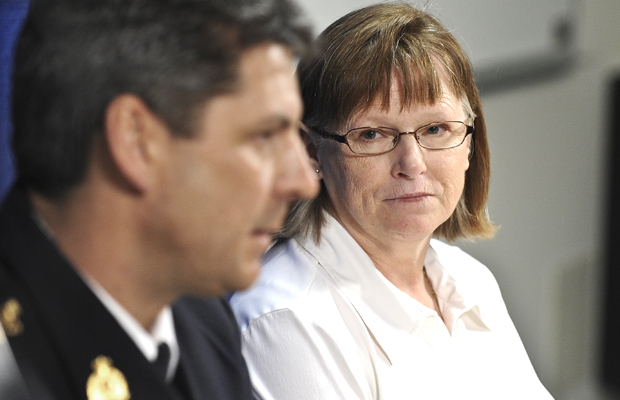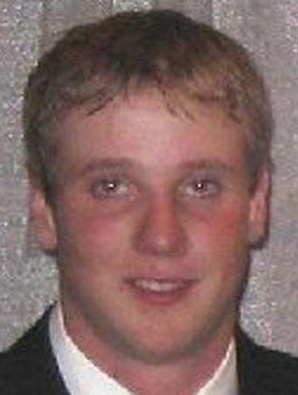Ian Bush’s mom drops suit
against RCMP over in-custody death
of her son
Ian Mulgrew, Vancouver Sun, April 21, 2010
News conference with Linda Bush and RCMP Chief Superintendent Craig Callens,
Deputy Criminal Operations Officer in Vancouver, April 21, 2010. Five years after
an officer killed her son, Ian Bush, by shooting him in the back of the head
while in custody Bush has dropped her civil suit against the RCMP
Photo: Bill Keay, PNG.
An undated family photo of Ian Bush, 22, who was shot by a police officer in
October, 2005 in Houston, B.C. Photo: Handout, Vancouver Sun Files.
VANCOUVER — Linda Bush, the mother of a 22-year-old millworker shot in the back of the head by an RCMP officer, said she is abandoning her lawsuit against the force and her nearly five-year-old fight for justice.
At a joint media conference with the force Wednesday in Vancouver, she said the decision was motivated by changes the force had made to its handling of in-custody deaths and the reforms under consideration.
Bush said she did not want to relive the “anger and despair” a civil case would have rekindled and that the cost of continuing the legal battle given B.C.’s user-pay regime was too heavy.
“[The court costs] put it out of reach for ordinary people,” she said.
Bush estimated well over $130,000 raised through donations across the country had already been spent.
“I know many people, including some who are very close to me, will be very disappointed with the decision,” she said.
“I do, however need to make the decision after considering what makes the most sense . . . . Nothing we can do will give Ian’s life back to him, so the only thing we truly want is not within our reach.”
Bush said she felt much more “comfortable” with the Mounties today than she did four-and-a-half years ago and couldn’t say whether that was from “forgiveness or maybe a form of acceptance.”
Ian Bush was killed Oct. 29, 2005 during a struggle in the Houston RCMP detachment after he was arrested with an open beer outside the northern B.C. town’s arena during a hockey game.
The officer was never charged.
Chief Superintendent Craig Callens, the deputy criminal operations officer in the province who accompanied Bush at Wednesday’s press conference, said her input into the refining of the force’s policies and procedures “had been significant.
“On behalf of the RCMP, I would like to thank you for the time and energy you have dedicated to seeing this process through. I can only imagine how emotionally difficult this has been for you and your family.”
Bush explained that while she was not happy giving up her fight, she believed she is achieving “justice for all of us, not necessarily for Ian.”
Nevertheless, she added that it was important to move forward and very important for effective civilian oversight of the force to be established.
In November, B.C. New Democrat MP Nathan Cullen introduced a private member’s bill that proposed the creation of an independent watchdog to probe cases of deaths in RCMP custody.
He said the bill would create a civilian watchdog modeled on Ontario’s Special Investigations Unit, which handles any Ontario Provincial Police’s in-custody death.
His initiative was sparked by Bush.
In February, RCMP Commissioner William Elliott announced the force would no longer investigate themselves in cases involving serious injury or death of suspects.
As a part of the interim policy, the Mounties refer cases to outside police forces, or provincial or federal review agencies.
In cases where it is not possible to call in outside investigators, the new policy ensures that officers are screened for conflict of interest and that the investigating officer outranks the officer being probed.
But it has little effect in B.C., which, unlike Ontario and Alberta, does not have an independent civilian-led agency with the power to investigate police-involved deaths or serious injuries.
The provincial government is thought to be mulling such a force but is waiting for the final report of the inquiry into the death of Robert Dziekanski before moving.
At the moment, the RCMP asks municipal departments such as Vancouver, Delta or Abbotsford to investigate police-involved fatalities or serious injuries.
Last year, the B.C. Association of Chiefs of Police unanimously called for the creation of a civilian-led unit for the “investigation of incidents involving police that have resulted in serious injury or death to any person as well as sensitive allegations of police misconduct.”
Retired B.C. Supreme Court judge William Davies, who conducted the inquiry into the death of Frank Paul, who died after being in Vancouver police custody, recommended the creation of an SIU-type unit.
And Paul Kennedy, the former head of the Commission for Public Complaints Against the RCMP, released a report last summer recommending that the RCMP refer investigations to outside police forces to ensure independence. He also pushed for more civilian involvement in probes involving death, serious injury and sex assault.
The federal government maintains it believes “effective review should be external to the force.”
Like Victoria, it is awaiting a pending report before acting — from the Air India inquiry.

